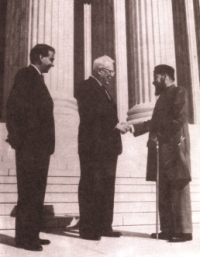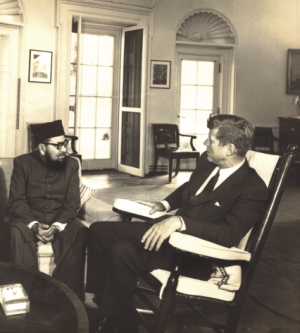|
Tribute
A Man of Principle and Courage
Tamizuddin Khan
Azizul Jalil
A rickshaw pulled over at the servants' entrance of the Sind Chief Court. A burkha-clad figure got down with a sheaf of papers in hand and went into the building. As the court sat in its regular session a little later, Mr. Tamizuddin Khan emerged from under the burkha and filed his writ petition challenging the governor-general, Ghulam Muhammad's arbitrary dissolution of the Pakistan National Assembly, of which he was the Speaker. Even though he was a cabinet minister in un-divided Bengal and had been in the high office of the Speaker of the National assembly for many years, succeeding Mohamamd Ali Jinnah in that position, he had taken that clever ruse, fearing detection by the police who were determined to block his entrance. That was the kind of courage and commitment to democratic principles that Tamizuddin Khan had.
 Tamizuddin Khan, Speaker of the Pakistan National
Assembly, on a tour of the US, meeting Chief
Justice Earl Warren in Washington D.C. (1963).
Tamizuddin Khan, Speaker of the Pakistan National
Assembly, on a tour of the US, meeting Chief
Justice Earl Warren in Washington D.C. (1963). |
The year was 1953-Pakistan was going through a period of civil unrest, social tension and absence of constitutional consensus. The governor-general had also dismissed the prime minister, Khwaja Nazimuddin, who clearly commanded a majority in the assembly. Thus a prime- minister who represented the demographic majority and the Eastern wing of the country was thrown out. While Nazimuddin had pathetically tried to appeal to the British Queen as the titular sovereign to redress the situation, Tamizuddin Khan - lawyer and constitutional politician that he was, took the matter to court. The lower court upheld his writ petition challenging the dissolution of the Constituent Assembly mainly on the ground that the governor-general had no such powers. It overturned the actions of Ghulam Muhammad.
The subsequent judicial saga has become a part of the political and constitutional history of the country. Since that time, not only in Pakistan but elsewhere in the world, the judgment of Chief Justice Munir of the Supreme Court that the 'Doctrine of Necessity' (public welfare is the highest law) validated the governor-general's actions, has often been quoted as precedent for dictatorial and military intervention. The Supreme Court had maintained that the governor-general's action in dissolving the Constituent Assembly was valid because it had failed to give a constitution and had in fact become a perpetual legislature. Sadly, Tamizuddin Khan's valiant efforts resulted in the formulation of a doctrine that really degenerated into a 'Doctrine of Convenience.' After the verdict, he was heartbroken and refrained from active politics for a number of years until 1962, when he was elected as a MNA under the 1962 constitution.
He then became the speaker of the National Assembly for the second time in June 1962 and remained in that position until his death on August 19, 1963.
Born in 1889 in a humble peasant family in Faridpur, Tamizuddin Khan had a hard time during his early life in pursuing his education. His marriage later to a more prosperous family assisted his higher education in Calcutta, where he did his masters in English in 1913 and law degree in 1915 from the Calcutta University. Starting law practice in Faridpur, he encountered discrimination, which the Muslims generally faced in the professions at that time
He was attracted to politics, got involved in the Swaraj movement and toured the interiors of many districts in the early nineteen-twenties. He participated in the Khilafat and Non-Cooperation movements and suffered imprisonment which was to pay a heavy toll on his health in later years. In his diary, published in a book form in Bangla many years after his death, he had mentioned that at that point he had to give up his legal profession and live on the meagre income of a small cloth seller in the interior markets. He had to carry heavy bags of merchandise on his shoulder and walk many miles to and from the market everyday. But the self-sacrificing man that he was, he never flinched in his commitment and underwent all the hardships for his conscience and convictions. In 1936, as a Muslim League candidate he was elected to the Bengal Legislature, defeating the prominent Congress candidate, Humayun Kabir. In the late thirties and early forties, he was a member of the Fazlul Huq ministry and later of the Nazimuddin Ministry. In 1945, he was elected to the Indian Central Assembly from Dhaka Mymensingh, defeating the well known landed aristocrat, Sir Abdul Halim Ghaznavi, and later elected to the Pakistan Constituent Assembly.

With President Kennedy at the White House during his US visit
A road 'Moulvi Tamizuddin Khan Road' was named after him in Karachi and it still is so named. Not an ordinary politician, Tamizuddin Khan was highly regarded throughout the country for his integrity, honesty and consistency in his long life, which was dedicated to public service.
.Copyright
(R) thedailystar.net 2008
|
|
